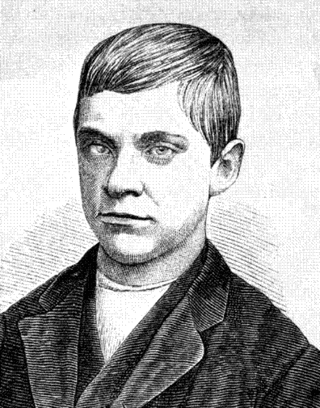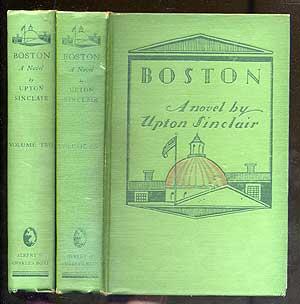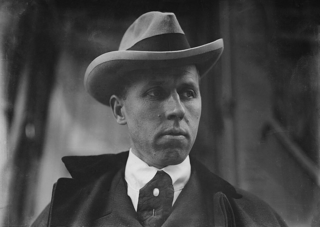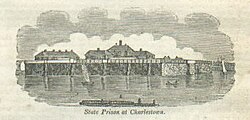
Nicola Sacco and Bartolomeo Vanzetti were Italian immigrant anarchists who were controversially convicted of murdering Alessandro Berardelli and Frederick Parmenter, a guard and a paymaster, during the April 15, 1920, armed robbery of the Slater and Morrill Shoe Company in Braintree, Massachusetts, United States. Seven years later, they were executed in the electric chair at Charlestown State Prison.

Jesse Harding Pomeroy was a convicted American murderer and the youngest person in the history of the Commonwealth of Massachusetts to be convicted of murder in the first degree. He was found guilty by a jury trial held in the Supreme Judicial Court of Suffolk County in December 1874. He was also a suspected serial killer.
Auburn Correctional Facility is a state prison on State Street in Auburn, New York, United States. It was built on land that was once a Cayuga village. It is classified as a maximum security facility.
Wrongful execution is a miscarriage of justice occurring when an innocent person is put to death by capital punishment. Cases of wrongful execution are cited as an argument by opponents of capital punishment, while proponents say that the argument of innocence concerns the credibility of the justice system as a whole and does not solely undermine the use of the death penalty.
The Massachusetts Correctional Institution—Cedar Junction, formerly known as MCI-Walpole, is a maximum security prison under the jurisdiction of the Massachusetts Department of Correction. It was opened in 1956 to replace Charlestown State Prison, the oldest prison in the nation at that time. MCI-Cedar Junction is one of two maximum security prisons for male offenders in the Commonwealth of Massachusetts. As of January 6, 2020 there was 346 Maximum and 65 Medium inmates in general population beds.

The Massachusetts Correctional Institution at Concord (MCI-Concord) is a medium security prison for men located in Concord, Massachusetts in the United States. Opened in 1878, it is the oldest running state prison for men in Massachusetts. This prison is under the jurisdiction of the Massachusetts Department of Correction. There are 570 inmates with a total capacity of 614 general population beds.

Alvan Tufts Fuller was an American businessman, politician, art collector, and philanthropist from Massachusetts. He opened one of the first automobile dealerships in Massachusetts, which in 1920 was recognized as "the world's most successful auto dealership", and made him one of the state's wealthiest men. Politically a Progressive Republican, he was elected a member of the Massachusetts House of Representatives, was a delegate to the Republican National Convention in 1916, and served as a United States representative from 1917 to 1921.

Fred H. Moore (1882–1933) was a socialist lawyer and the defense attorney of the controversial Sacco and Vanzetti case. He had collaborated in many labor and Industrial Workers of the World trials. He played a minor role in several celebrated I.W.W. trials, including the Los Angeles Times bombing case in 1911 and the Ettor–Giovannitti case, which arose from the 1912 Lawrence, Massachusetts, textile strike. Following the acquittal of Ettor and Giovannitti, Moore spent the next several years roaming the country defending I.W.W. organizers. He was involved in the Centralia massacre trial and the mass prosecution, on charges of sedition, of the I.W.W. in Chicago in 1918. Errors in a later trial, however, led Big Bill Haywood to demand Moore's resignation as I.W.W. attorney in 1920. Moore's career was revived by his being hired to head the defense team for Sacco and Vanzetti in the summer of 1920.

The Charles Street Jail, also known as the Suffolk County Jail, is an infamous former jail located at 215 Charles Street, Boston, Massachusetts. It is listed in the state and national Registers of Historic Places. The Liberty Hotel, as it is now known, has retained much of its historic structure, including the famed rotunda.

Boston is a novel by Upton Sinclair. It is a "documentary novel" that combines the facts of the case with journalistic depictions of actual participants and fictional characters and events. Sinclair mixed his fictional characters into the prosecution and execution of Sacco and Vanzetti.
Bridgewater State Hospital, located in southeastern Massachusetts, is a state facility housing the criminally insane and those whose sanity is being evaluated for the criminal justice system. It was established in 1855 as an almshouse. It was then used as a workhouse for inmates with short sentences who worked the surrounding farmland. It was later rebuilt in the 1880s and again in 1974. As of January 6, 2020 there were 217 inmates in general population beds. The facility was the subject of the 1967 documentary Titicut Follies. Bridgewater State Hospital falls under the jurisdiction of the Massachusetts Department of Correction but its day to day operations is managed by Wellpath, a contracted vendor.

Edward Holton James was an American socialist and, later, fascist. He was the nephew of philosopher William James and novelist Henry James.
Capital punishment, more commonly known as the death penalty, was a legal form of punishment from 1620 to 1984 in Massachusetts, United States. This practice dates back to the state's earliest European settlers. Those sentenced to death were hanged. Common crimes punishable by death included religious affiliations and murder.
Daniel J. Hurley was an American football player and doctor. He played college football at the halfback position for the Harvard Crimson football team and was selected as a consensus All-American in 1904 and 1905. He was team captain for two years. Hurley was once badly injured, suffering a blood clot in the brain.
Concord Prison Outreach (CPO) is a non-profit organization based in Concord, Massachusetts, and dates back to 1968. The organization is independent, volunteer-driven and maintains an active steering committee and board of directors.

Sara Rosenfeld Ehrmann was a Boston civic leader who fought against capital punishment both city and nationwide. Best known for her work establishing the 1951 "Mercy Law" in Massachusetts, which allowed juries to opt out of the death penalty on first-degree murder cases, Ehrmann was an influential leader of the Massachusetts Council for the Abolition of the Death Penalty (1928–1969) and the American League to Abolish Capital Punishment (1949–1969). She launched her career as a direct response to the internationally controversial Sacco and Vanzetti case, which her husband worked on as an assistant defense councilman.

Joseph A. Langone Jr. (1896–1960) was a Massachusetts state senator from 1933 to 1940, and was Boston Election Commissioner in the 1940s.
Not all of the 5 million Italians who immigrated to the United States between 1820 and 1978 came through Ellis Island. Many came through other ports, including the Port of Boston. Exactly how many stayed in Boston is unknown, but it was enough to make Italians the second largest ancestry group in Boston, after the Irish. Most settled initially in the North End; others settled in East Boston, the West End, Roxbury, and other neighborhoods.
"Sacco-Vanzetti Story" is a two-part American television play that was broadcast on June 3, 1960, and June 10, 1960, as part of the NBC Sunday Showcase series.

Victor Folke Nelson was a Swedish-American writer, prisoner, and prison reform advocate. He spent many years incarcerated in both the New York and Massachusetts prison systems and came to the attention of neurologist Abraham Myerson and penologist Thomas Mott Osborne for his potential as a writer. In 1932, Nelson published his book Prison Days and Nights with the assistance of Dr. Myerson.












